
- Free Article: No
- Contents Category: Fiction
- Review Article: Yes
- Online Only: No
- Custom Highlight Text:
In the opening pages of The Casual Vacancy, a man named Barry Fairbrother collapses and dies in the car park of the Pagford Golf Club. For the next seven chapters, news of his premature demise spreads through the small English town. Reactions vary
- Book 1 Title: The Casual Vacancy
- Book 1 Biblio: Little, Brown (Hachette), $39.99 hb, 503 pp, 9781408704202
It is no joke: Barry Fairbrother is dead, all right. Yet there is a tincture of grim humour in The Casual Vacancy’s awkward and repetitive overture. As she introduces her cast of characters, J.K. Rowling establishes the social dynamic of her novel. Their differing responses – banal, stilted, platitudinous, shocked, indifferent – hint at the small-mindedness and egotism that is at the core of its vision. For this novel, beginning with the death of a man named Fairbrother, is concerned with the loss of fraternity. Pagford is presented, with a wryness that gradually gives way to steely disapproval, as a microcosm of a society that has abandoned any notion of fairness: a society that is stratified, selfish, and riven by petty rivalries. Most of the adult characters are plotting to claim Fairbrother’s vacated seat on the Parish Council before his body is cold. The council is divided by the issue of a grimy housing estate known as the Fields, which one faction, led by the fat and sleazy Howard Mollison, wants to exclude from the town. In the absence of the socially conscious Fairbrother, a respected man who had rallied the opposing faction, the political dispute becomes increasingly personal. Each councillor comes to be driven more by the desire to see his or her enemies fail than by a desire to realise any positive objectives.
A wag has already dubbed The Casual Vacancy ‘Mugglemarch’ – an allusion to some books Rowling wrote for younger readers that were apparently quite successful. The joke proves to be surprisingly apposite. Rowling is no George Eliot (no shame there), but she does establish herself as a canny moralist whose summations have a kind of blunt perspicacity. The sourly discontented Samantha Mollison thinks that her ‘crass, uninhibited way of talking, especially when drunk, constituted trenchant humour’; the dim-witted bully Simon Price is ‘a contented prisoner of his own contempt for other people’; while the insipid, neurotic Colin Wall is ‘perennially appalled by the threadbare state of other people’s morals’. At the culmination of one of the novel’s more effective scenes – that staple of social realism, a dinner party that descends into a row – Rowling observes that Samantha’s smug husband Michael’s ‘inner certainties had been no more rearranged by Kay’s arguments than a breeze can move a boulder’.
That Rowling’s troubled teenage characters are more sympathetically drawn than her blinkered adults is of thematic significance. Indeed, the novel’s social conscience is evident in its depiction of two parallel worlds, the adult and the adolescent, between which there is interaction but no genuine communication. While the adults are always alert to their own interests, and vigilant when it comes to their perceived enemies, they remain ignorant of their children’s travails and frequently behave in ways that are neglectful or belittling. The intrigue that grips the council in the second half of the novel and the events that lead to its tragic dénouement are both the result of this generational divide. There is a savage comment implicit in the fact that the catalyst for the latter is an ill-fated union between the socially disadvantaged Krystal Weedon – who is well on her way to inheriting the wretched life of her drug-addicted mother, yet retains a flickering sense of responsibility – and ‘Fats’ Wall, a teenage rebel and an individualist of a Nietzchean stripe, whose selfishness mirrors that of the adults he affects to despise.
The Casual Vacancy is fuelled by a palpable dismay at the state of British society. It means to kick against the prevailing ideology of self-interest and indifference that leads to the entrenchment of disadvantage. On one level, it is a cautionary tale offered in the hope that its readers might take stock of the kind of society they have created and ask why they allow its injustices to persist. It is, in other words, the kind of novel that one might easily scoff at. (Won’t someone think of the children?) And, on one level, it is not a great book. As a stylist, Rowling is strictly meat and potatoes. When she tries to elevate her tone, she stumbles. Yet her dramatic instincts are often sound, and, more importantly, her characters are drawn with enough grit and insight to make The Casual Vacancy into a credible piece of socially engaged fiction, and even at times an astute one.


Comments powered by CComment